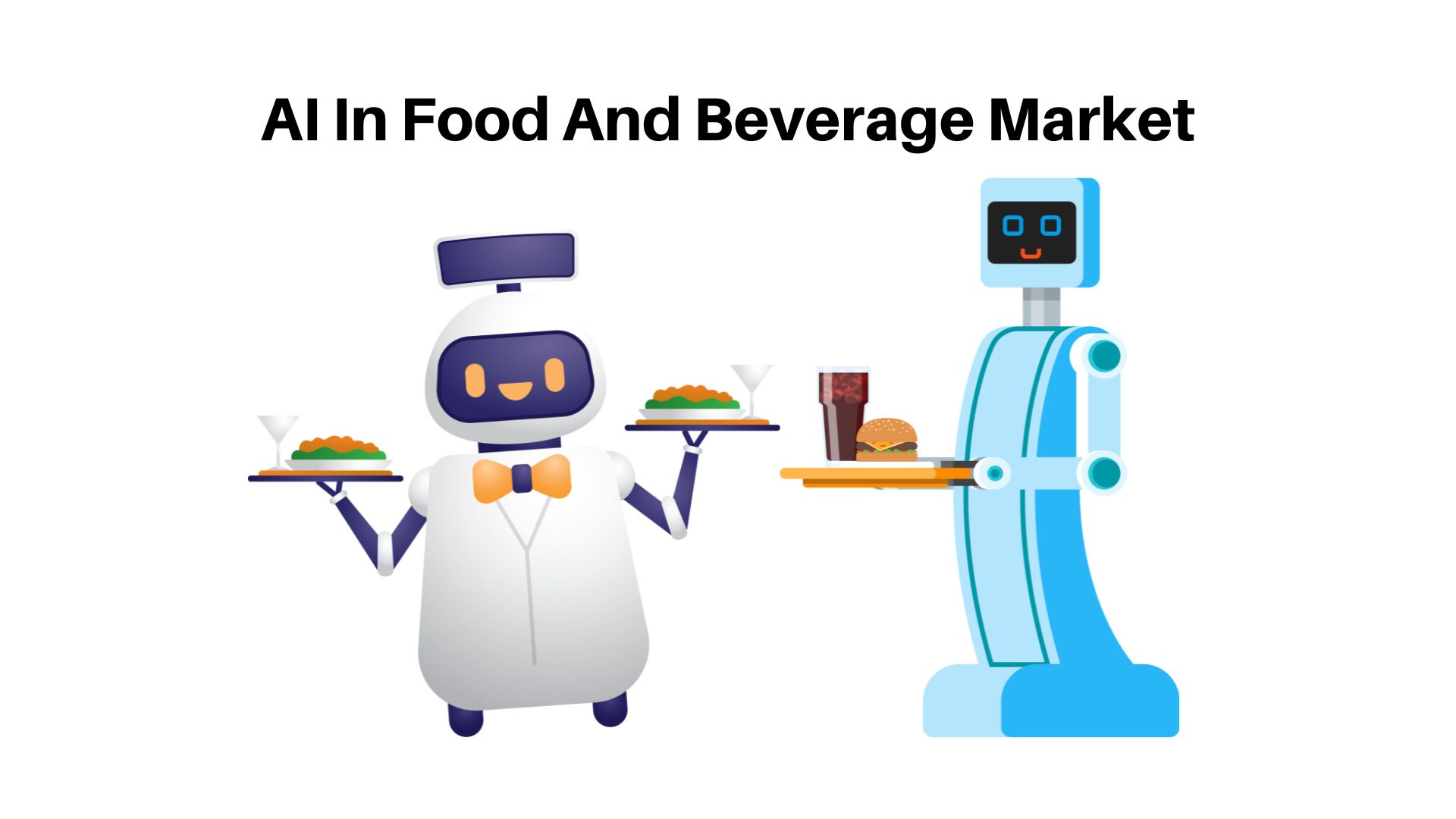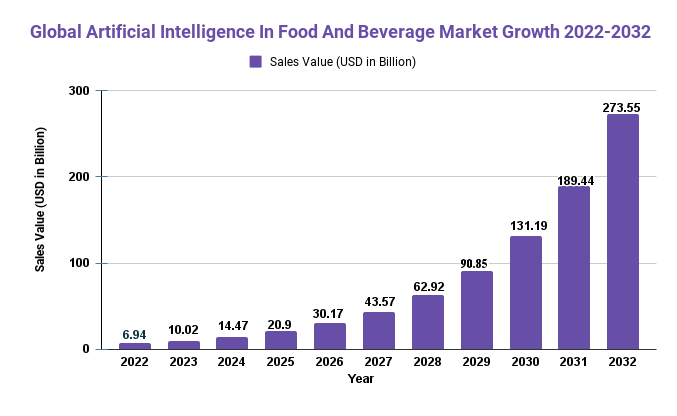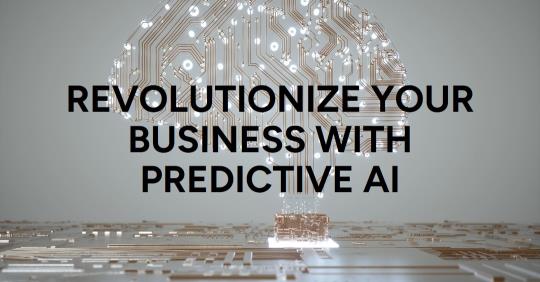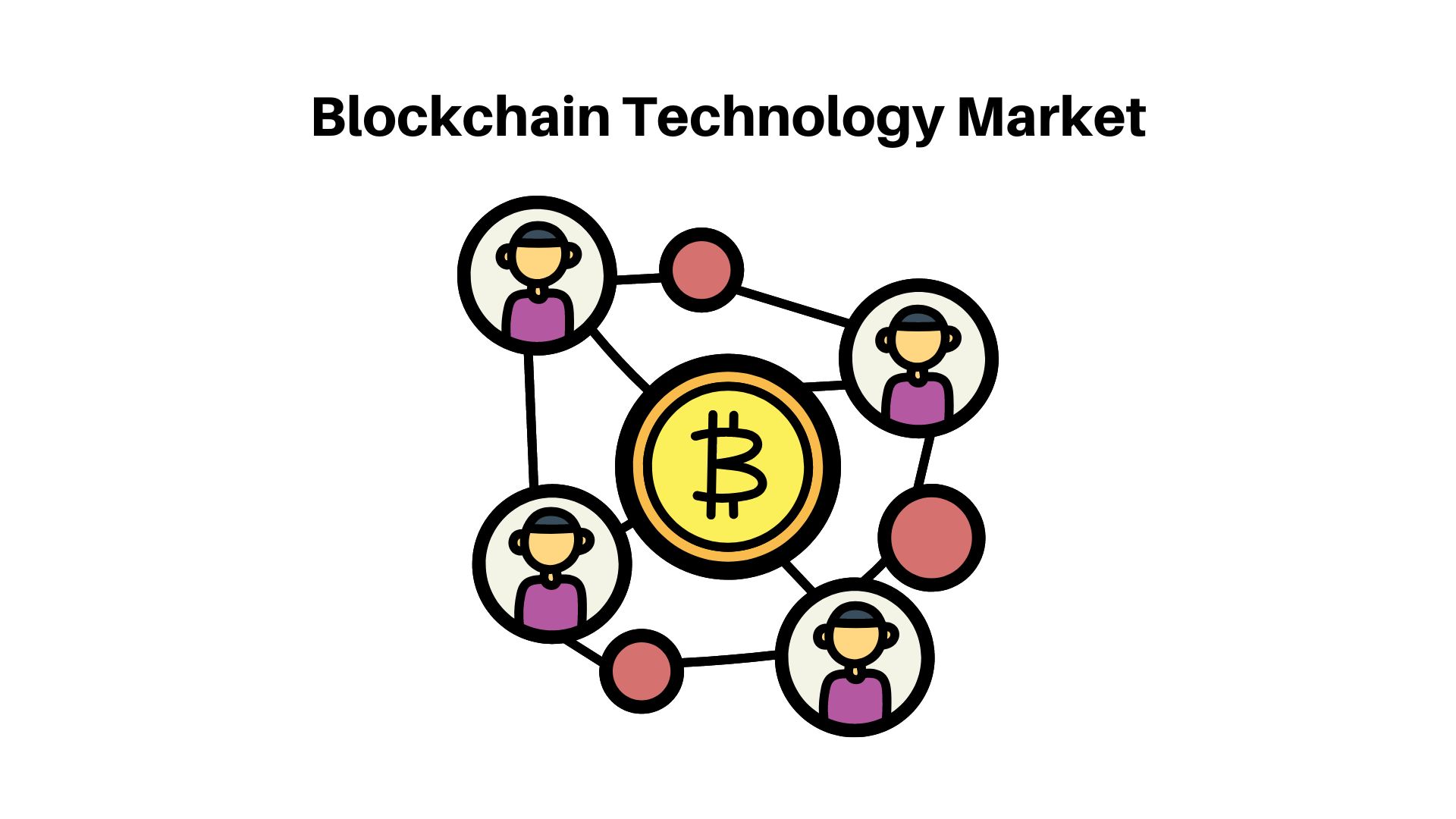Artificial Intelligence In Food And Beverage Market CAGR 44.4% | Development Ideas By 2032

Page Contents
Published Via 11Press: The global artificial intelligence in food and beverage market size is expected to be worth around USD 273.55 Bn by 2032 from USD 6.94 Bn in 2022, growing at a CAGR of 44.4% during the forecast period from 2022 to 2032.
The global artificial intelligence (AI) in food and beverage market is experiencing exponential growth due to advances in AI technology and an uptick in processed food product demand. AI is being utilized for various applications such as quality control, inventory management, and predictive maintenance within this industry. Projections show that investments made into AI by key players will continue to fuel growth over the coming years due to increasing consumer preferences for customized food items.
AI in product development is helping companies create novel flavors and textures tailored to changing consumer preferences. Supply chain management utilizes AI techniques for better inventory control and reduced waste production, while quality assurance systems powered by AI help guarantee product safety and consistency.
Request For Sample Report Before Purchasing: https://market.us/report/artificial-intelligence-in-food-and-beverage-market/request-sample

Key Takeaways
- The global AI in food and beverage market is experiencing rapid growth due to advances in AI technology and growing demand for processed food items.
- AI is being applied in a range of applications, such as quality control, inventory management and predictive maintenance within the food and beverage industry.
- Industry leaders are investing heavily in AI technology to increase operational efficiency and optimize their processes.
- In the upcoming years, the market for personalised foodstuffs and the burgeoning use of AI by small and medium-sized businesses (SMEs) in the food and beverage sector are both anticipated to witness solid growth.
- The hefty cost of implementing AI and worries about data security and privacy, meanwhile, could restrict market growth.
Regional Analysis
- North America: North America is expected to hold a substantial share of the global AI in food and beverage market due to the presence of key players like IBM and Google, who are investing heavily in AI technology. Furthermore, rising demands for processed food products as well as improved supply chain management are fueling growth within North America's borders.
- Europe: Europe is expected to witness significant growth in the AI food and beverage market due to the increasing adoption of AI throughout the region. With an emphasis on sustainable agriculture as well as needs for improved food safety and traceability, demand for AI in this sector of European food production and beverage manufacturing will only increase.
- Asia Pacific: The Asia Pacific region is projected to experience the highest growth rate in the AI in food and beverage market due to an expanding population, rapid urbanization, and increasing demand for processed food products. Furthermore, emerging economies like China and India are fueling this expansion within this region.
- Latin America: The Latin America region is expected to experience moderate growth in the AI in food and beverage market due to increasing investments into this sector. The focus on improving food safety and reducing food waste are driving demand for AI within this region's food and beverage sector.
- Middle East and Africa: The Middle East and Africa region is expected to experience slow growth in the AI in food and beverage market due to a lack of adoption of AI technology there. However, increasing concerns over food security and improved supply chain management are expected to drive market expansion within this region.
Market Trends
- The former chairman of Tata Sons in Techbin Solutions Pvt Ltd’s Niki.ai represents the growth and investments in chatbot usage. This chatbot is AI-powered and can converse with customers to help them order a variety of services through a chat interface.
- AI is being used to predict consumer behavior. This technology can be used by marketers and organizations to engage with customers in deeper interactions and improve their experience with the brand.
- Chatbots are also becoming popular because they are able to work offline. According to an American Express survey, more than half of customers would spend more if they received superior customer service. This opens up huge opportunities for AI and will likely fuel AI growth within the food-and-beverage market. In August 2013, Jio Haptik Technologies Limited, partnered with Zoop, an IRCTC-partner, to provide food delivery on trains. This partnership will allow railway passengers seamless food ordering and delivery during train journeys. With this WhatsApp-based self service food delivery platform, passengers can place orders and receive their food right to their seats. They also have real-time order tracking and feedback.
- Artificial intelligence can also be used to monitor and analyze customer sentiments and behavior across social media channels. AI creates a detailed customer profile that matches customers' social experiences with the product. These powerful insights allow firms to aim to improve customer experience and increase productivity, which can lead to market growth.
Purchase This Report Via Secured Link and Avail Discount: https://market.us/purchase-report/?report_id=65198
Drivers
- A Growing Trend in Personalized Nutrition: AI is being utilized to create tailored nutrition plans and customized food products to meet changing consumer preferences.
- Advancements in AI Technology: Technological advances such as machine learning and natural language processing are fueling the growth of this market by improving the accuracy of AI systems.
Restraints
- High Cost of AI Implementation: The high cost of AI implementation and lack of skilled personnel are preventing its widespread adoption in the food and beverage industry.
- Concerns Regarding Data Privacy and Security: The application of AI in food and beverage manufacturing necessitates collecting and processing sensitive data, raising issues around data privacy and security.
- Lack of Standardized Regulations: The absence of standardized regulations for AI usage in food and beverage manufacturing is hindering growth in this market.
Opportunities
- The growing interest in plant-based and sustainable foods presents artificial intelligence (AI) with new design challenges.
- AI is becoming more and more prevalent among small and medium-sized enterprises (SMEs), creating new market expansion prospects.
- Application of AI to Precision Agriculture: AI is being applied in precision agriculture to boost crop yields and minimize waste, potentially opening the door for its adoption within food and drink production.
Challenges
- Lack of Awareness and Understanding of AI Technology: Lacking awareness and comprehension about AI technology among stakeholders in the food and beverage industry poses a major obstacle to its adoption.
- Data Scarcity: In the food and beverage industry, data availability can be a serious hindrance when developing accurate AI models.
- Ethical Considerations: The use of AI in the food and beverage industry brings with it ethical challenges such as its effect on employment opportunities and potential bias in decision-making processes.
Recent Developments
- IBM and McCormick Partnership: In 2020, IBM and McCormick & Company, a world leader in spices, announced an alliance to develop AI-powered food products and flavors. Through machine learning techniques and artificial intelligence (AI), these companies hope to create novel flavor combinations while streamlining product development processes.
- Unilever's AI-Powered Product Development: In 2021, Unilever revealed they had created an AI-driven product development tool that can create new ice cream flavors in just days. This system utilizes machine learning algorithms to analyze consumer preferences and ingredient combinations in order to craft unique recipes.
- Cargill's AI-Powered Chicken Farming: Cargill, one of the world's largest food and agriculture companies, is using AI technology to optimize chicken farming operations. They utilize cameras equipped with artificial intelligence (AI) that monitor chicken health and behavior so farmers can identify potential issues early on and boost productivity.
- AI-Powered Food Safety: In 2021, the Food and Drug Administration (FDA) in America announced a partnership with IBM to develop an AI-powered platform to enhance food safety. This platform utilizes machine learning algorithms to analyze data from multiple sources to detect potential food safety issues and prevent outbreaks.
Key Market Segments
Type
- Hardware
- Software
- Services
Application
- Transportation and logistics
- Quality Control
- Production Planning
Key Market Players
- Aboard Software
- Analytical Flavor Systems
- Deepnify
- ImpactVision
- IntelligentX Brewing
- NotCo
- Sight Machine
Report Scope
| Report Attribute | Details |
| The market size value in 2022 | USD 6.94 Bn |
| Revenue forecast by 2032 | USD 273.55 Bn |
| Growth Rate | CAGR Of 44.4% |
| Regions Covered | North America, Europe, Asia Pacific, Latin America, and Middle East & Africa, and Rest of the World |
| Historical Years | 2017-2022 |
| Base Year | 2022 |
| Estimated Year | 2023 |
| Short-Term Projection Year | 2028 |
| Long-Term Projected Year | 2032 |
Contact us
Contact Person: Mr. Lawrence John
Market.us (Powered By Prudour Pvt. Ltd.)
Tel: +1 718 618 4351
Send Email: [email protected]
The team behind market.us, marketresearch.biz, market.biz and more. Our purpose is to keep our customers ahead of the game with regard to the markets. They may fluctuate up or down, but we will help you to stay ahead of the curve in these market fluctuations. Our consistent growth and ability to deliver in-depth analyses and market insight has engaged genuine market players. They have faith in us to offer the data and information they require to make balanced and decisive marketing decisions.



